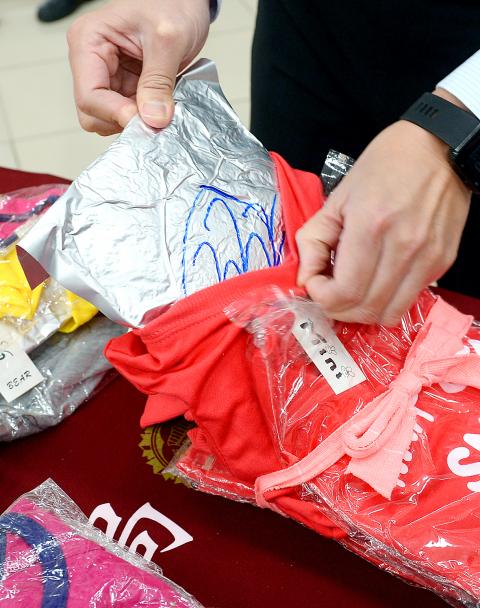Keelung authorities last month confiscated 600kg of MDMA, the largest amount in the nation’s history, the Ministry of Justice Investigation Bureau said yesterday.
The haul of MDMA, which is commonly known as ecstasy, has a blackmarket value of NT$3 billion (US$102.24 million) and amounts to 23 million doses, officials said.
The bureau announced the bust at a news conference attended by bureau Director-General Tsai Ching-hsiang (蔡清祥), Deputy Minister of Justice Tsai Pi-chung (蔡碧仲) and Keelung District Prosecutors’ Office chief prosecutor Chen Hung-ta (陳宏達).

Photo: Lin Cheng-kung, Taipei Times
In December last year, the bureau’s Taipei office received intelligence that smugglers were moving a large quantity of drugs from China in anticipation of increased demand at night clubs over the Lunar New Year period, officials said.
The Keelung District Prosecutors’ Office was notified and it opened an inquiry, with the bureau leading the multiagency task force, which also involved the Customs Administration, officials said.
After reviewing tens of thousands of import documents, investigators zeroed in on several shipping containers stored in facilities in Taipei, which they inspected on Jan. 15, officials said.
With the aide of sniffer dogs, investigators discovered 977 bags in three shipping containers, inside boxes that had been listed as containing clothing on import documents, officials said.
Laboratory tests confirmed the bags contained MDMA, they said.
After surveiling suspects, bureau agents in Taichung on Monday arrested a man surnamed Chen (陳), who is the registered owner of the shipment, officials said.
Chen is to be held in pretrial detention while investigations continue, they added.
The bust was the latest in a series of investigations that have uncovered large quantities of narcotics, including the discovery of a drug lab in Taipei’s Nangang District (南港) in October last year; a smuggling operation involving 14kg of heroin from Taichung in November; and the discovery of a ketamine lab in Taichung in December.

The Mainland Affairs Council (MAC) today condemned the Chinese Communist Party (CCP) after the Czech officials confirmed that Chinese agents had surveilled Vice President Hsiao Bi-khim (蕭美琴) during her visit to Prague in March last year. Czech Military Intelligence director Petr Bartovsky yesterday said that Chinese operatives had attempted to create the conditions to carry out a demonstrative incident involving Hsiao, going as far as to plan a collision with her car. Hsiao was vice president-elect at the time. The MAC said that it has requested an explanation and demanded a public apology from Beijing. The CCP has repeatedly ignored the desires

Many Chinese spouses required to submit proof of having renounced their Chinese household registration have either completed the process or provided affidavits ahead of the June 30 deadline, the Mainland Affairs Council (MAC) said on Thursday. Of the 12,146 people required to submit the proof, 5,534 had done so as of Wednesday, MAC deputy head and spokesperson Liang Wen-chieh (梁文傑) said. Another 2,572 people who met conditions for exemption or deferral from submitting proof of deregistration — such as those with serious illnesses or injuries — have submitted affidavits instead, he said. “As long as individuals are willing to cooperate with the legal

The Ma-anshan Nuclear Power Plant’s license has expired and it cannot simply be restarted, the Executive Yuan said today, ahead of national debates on the nuclear power referendum. The No. 2 reactor at the Ma-anshan Nuclear Power Plant in Pingtung County was disconnected from the nation’s power grid and completely shut down on May 17, the day its license expired. The government would prioritize people’s safety and conduct necessary evaluations and checks if there is a need to extend the service life of the reactor, Executive Yuan spokeswoman Michelle Lee (李慧芝) told a news conference. Lee said that the referendum would read: “Do

Taiwan's Vice President Hsiao Bi-khim (蕭美琴) said Saturday that she would not be intimidated by the Chinese Communist Party (CCP), following reports that Chinese agents planned to ram her car during a visit to the Czech Republic last year. "I had a great visit to Prague & thank the Czech authorities for their hospitality & ensuring my safety," Hsiao said on social media platform X. "The CCP's unlawful activities will NOT intimidate me from voicing Taiwan's interests in the international community," she wrote. Hsiao visited the Czech Republic on March 18 last year as vice president-elect and met with Czech Senate leadership, including